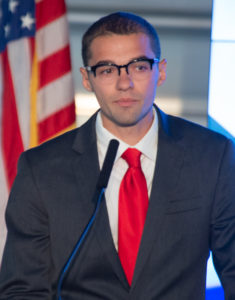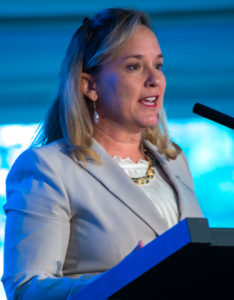COLORADO SPRINGS, COLO – Colorado House Speaker K.C. Becker and Colorado Rising Action Executive Director Michael Fields debated the pros and cons of Proposition CC at El Pomar’s Penrose House Tuesday afternoon.
Proposition CC, if approved by voters in November, would permanently forfeit all Taxpayer Bill of Rights (TABOR) refunds owed to taxpayers by the state for overcollection of taxes.
Prop CC would enact House Bill 19-1257, which would allow the state to retain those over-collected taxes and place them in a special general fund account. According to the bill, use of the funds would be restricted to higher education, public schools, and roads, bridges and transit.

A companion bill, House Bill 19-1258, signed into law by Governor Polis June 3, provides for how the money must be allocated. That bill generally requires that the money from retained over-collected taxes be “allocated in one-third shares” for the specified spending areas.
But beyond that division, references are made deep in HB 1258 to other statutes that make it difficult to determine where the money will actually go.
Fields said, “Money is fungible. We have no guarantee that this money is going towards the things that they said. This isn’t a 5-year time out like Referendum C was, this would be forever taking your tax refunds from TABOR. It’s a blank check.”
Moreover, Fields pointed out the fact that what one legislature writes into the statute books, another can repeal or change.
“It’s a statute not an amendment, therefore the statute can be changed next year by the legislature,” Fields said. “The Speaker said we cannot bind the hands of future legislators. But they want to bind the hands of future taxpayers forever by taking away our TABOR tax refund. Maybe it doesn’t raise tax rates, but it surely raises taxes in that they’re keeping and spending more of your money, 1.7 billion dollars over the next three years. Our tax liability is going up.”
Of the benefit of TABOR Fields said, “We have the number one economy in the nation.”
“I think that there are people in Colorado that are frustrated with these artificial handcuffs that limit the ability of our state to make critical investments,” said Becker.
Fields responded, “It’s not an artificial formula at all. Voters approved this in 1992 on the ballot to make this formula, population plus inflation.”
Alluding to a lawsuit to throw out TABOR completely filed by Democrats in federal court, that had been dismissed but was recently revived, Becker said, “I think there are folks who believe that [TABOR] infringes on a republican form of government.”
“The entirety of TABOR doesn’t make sense. It limits when you can put some things on the ballot, it limits the kind of taxes the state could even propose,” said Becker. “I think most people when they were voting on tabor only knew about the portion that you’re going to vote on tax increases.”
“Our budget is big and getting bigger. [It is] 32.5 billion dollars. Just ten years ago it was 19 billion, we’re going up by over a billion dollars every year,” said Fields. “The problem is that they won’t lock that money in for the long term. They say we don’t have enough money to fix our roads. But it is there, we just have to commit those dollars to the priorities that we need.”

“If you look at polling across the state people want our transportation infrastructure fixed, they want roads fixed, they also want teachers to get paid more,” Fields continued.
Addressing the issue of education, Becker said, “We’re going to continue to have have and have-not schools when it comes to funding. I do not think that your zip code should determine the level of educational opportunity you get. I want that to be true whether they’re in Boulder, which will pass local taxes, or whether they’re in Grand County, which doesn’t pass local taxes.”
But despite her apparent concern with local voter decision-making about local taxes, Becker acknowledged that how that money is spent is up to the local school district.
“How much your own school district is paying for admin costs versus anything else is a decision made by your local school district,” Becker said. “If you’re not happy about that talk to your school board.”
Fields said, “Proposition CC puts more money into a system that is unfair and unequal to start with. There are certain school districts in the state that are getting the short end of the stick. A lot of them in rural Colorado who don’t get the same amount of benefit from the state that some of these richer districts do.”
“I think that has to fundamentally change,” Fields said. “I think [turning down Proposition CC] would force a conversation about how much money is going to administrative costs. Only 54% of the money we spend on education gets to instruction. Next door in Nebraska it’s 65%.”


